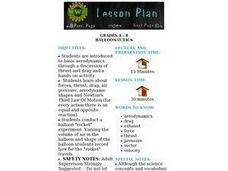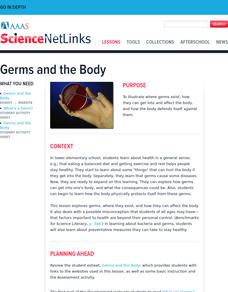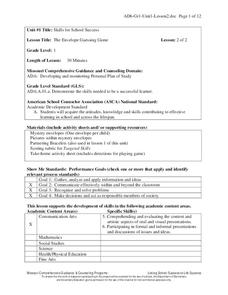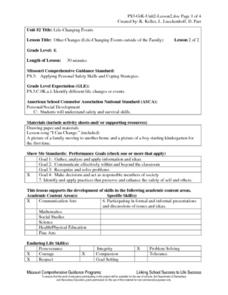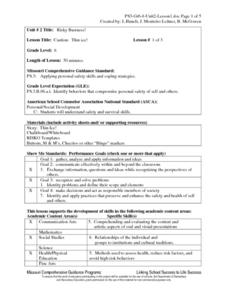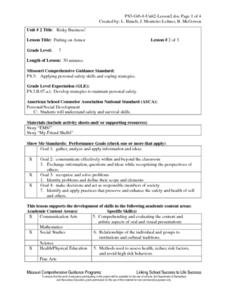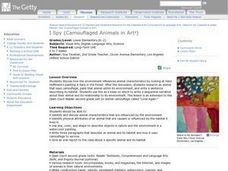Curated OER
How Does a Friend Act?
Students brainstorm a list of characteristics that friends should and should not have. In groups, they are given a set of hand puppets in which they role-play different scenerios in front of the class. To end the lesson, they are shown...
Curated OER
The Barnum and Bailey Bartered Bride
Students focus on the study of The Bartered Bride by integrating the theme of the circus begin the lesson with a "KWL" strategy map on the Circus. Students are asked: What do you know about the circus?
Curated OER
Balloonautics
Students are introduced to basic aerodynamics through a discussion of thrust and drag and a hands-on activity. They examine the forces of thrust, drag, air pressure, aerodynamic shapes and Newton's Third Law Of Motion.
Curated OER
The Twelve Months: A Slavic Cinderella Variant
Young scholars locate Slavic countries and identify a few characteristics of those countries. They read and/or listen to the Slavic tale, "The Twelve Months," and compare this version with another Cinderella story.
Curated OER
Air and Water Pressure
Students examine buoyancy and fluid pressure. They conduct a series of fun experiments to discover the effects of pressure and explore how pressure differences can be used to float, lift, transport, or hold a material in place.
Curated OER
What Can I Do?
Students explore ways to handle conflict. In this mental health lesson, students investigate ways to tell others how they feel and discover that identifying their emotions can help them resolve conflict.
Curated OER
Important Quotes
Young scholars investigate the novel "Pride and Prejudice". They identify themes, learn to analyze works of literature, recognize and identify literary techniques for the benefit of attaining skills of criticizing literature.
Curated OER
Conversation Heart Bingo
Primary learners play conversation heart bingo in order to write common phrases. They will create a bingo card with common phrases from conversation heart candy. The teacher calls out phrases and the learners cover them with conversation...
Curated OER
The Learning Book
Students make a "Learning Book" with the skills needed to be a successful learning in school. They review basic learning skills by making a book and singing "The Learning Song". They demonstrate skills needed to be a successful learner.
Curated OER
Life-Changing Events
Students investigate the life changing events that can take place in the life of a school age child. They conduct class discussion about some examples of life changing events. The lesson is targeted towards counseling or opening days of...
Curated OER
Goldilocks Revisited
Second graders investigate the story of "The Three Bears" while focusing on the character of Goldilocks. They answer key questions that are focused upon the development of positive feelings and reactions. Students discuss the possible...
Curated OER
Be a Problem Solving Star
Second graders investigate the skill of solving problems. They have class discussion about problem solving and identify the steps in settling conflicts. The strategies are demonstrated for application to problem situations and student...
Curated OER
The Changing Times of The Future
First graders share their wishes for the future and discuss changes that have taken place. They observe a puppet who describes life in the future and identifies positive and difficult challenges he may face. Individual students draw a...
Curated OER
Celebrate Your Culture
Third graders share some special occasions/events observed by their families/neighborhoods, and special activities/traditions connected with the event. They identify their own culture's customs and those of others.
Curated OER
I'm A Star!
Fourth graders answer questions about being responsible community member. They listen and brainstorm ideas of why it important to be responsible community members. Students are given a copy of "I'm A Star Community Member" game...
Curated OER
What Is Important to Me?
Students respond to prompt with awareness of personal value of possessions. They list the criteria used to determine worth and value. They listen and ask questions or add comments and check their own measures of value with those the...
Curated OER
Caution: Thin ice!
Sixth graders listen to story and respond with comments or questions. They brainstorm unsafe behaviors and randomly fill out templates with different risky behaviors listed on the board. They play RISKO, the Bingo type game.
Curated OER
Putting On Armor
Seventh graders are read the story "EMS Code Blue" and asked to share what they would do in the different situations. As a class, they discuss the importance of getting help for mental or social problems and are given a list of resources...
Curated OER
I spy (Camouflaged Animals in Art!)
Students create a picture of a camouflaged animal in its habitat. In this visual arts lesson, students look at Hans Hoffmann's painting A Hare in the Forest and discuss the animal's camouflage. They research their own animal to...
Curated OER
Regional Landforms and Native People
Third graders study the Native American tribes of Maidu and Miwok by studying Internet artifacts, culture, language, music, storytelling, architecture, food, clothing, crafts and geology.
Curated OER
I Spy (Camouflaged Animals in Art!)
Make connections about animal characteristics and the animal's environment. In this animal characteristics lesson plan, students use a piece of art as a springboard for a discussion about animals and camouflage. Students choose an animal...
Curated OER
EBT-rimental
Students engage in a lesson plan that gives them the tools needed to become knowledgeable credit consumers. The companion website for the ITV program TV-411 is used to provide learners with an interactive experience of what credit has to...
Curated OER
How Does Your Garden Grow?
Students construct and maintain a school garden. In this gardening lesson, students plan the construction of the garden by writing letters to local businesses asking for supplies and materials; students build the garden using their math...
Curated OER
Filling the Glass (Water, Air, and Fractions)
Students predict which of two glasses is 1/2 full using visual estimation, height measurement, and liquid measurement methods. Mathematical equations to accurately solve the problem are determined and verified.


